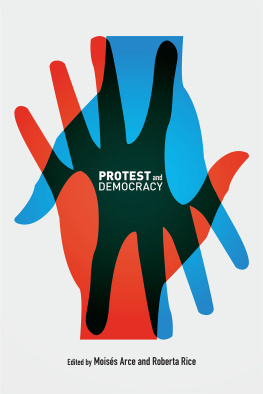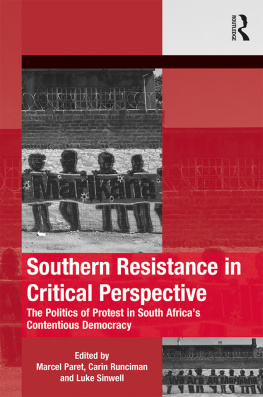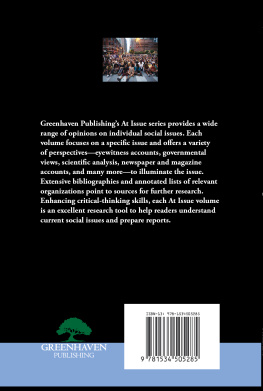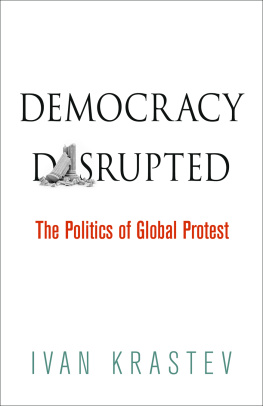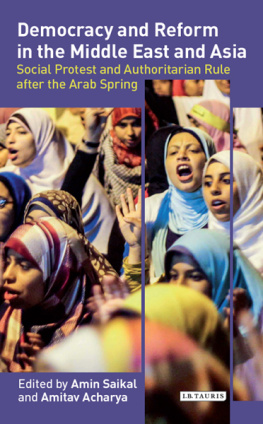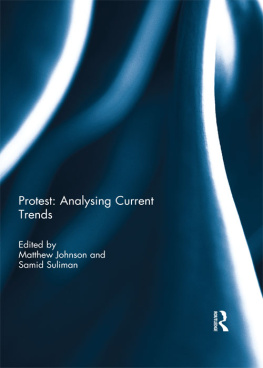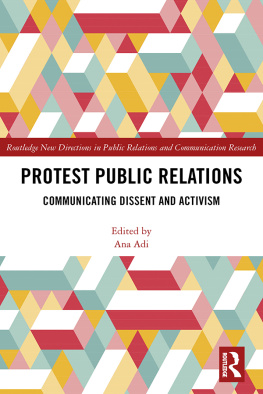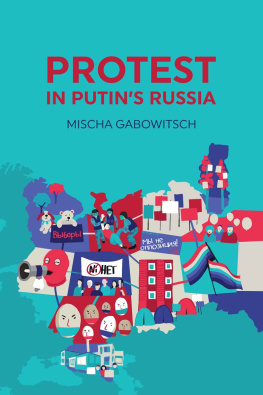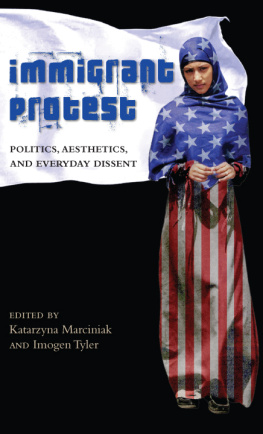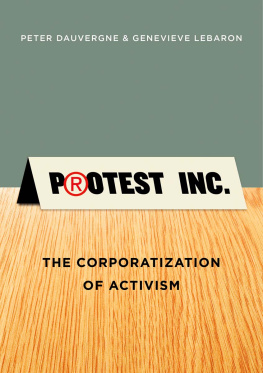PROTEST and
DEMOCRACY
PROTEST and
DEMOCRACY
Edited by Moiss Arce and Roberta Rice
2019 Moiss Arce and Roberta Rice
University of Calgary Press
2500 University Drive NW
Calgary, Alberta
Canada T2N 1N4
press.ucalgary.ca
This book is available as an ebook which is licensed under a Creative Commons license.
The publisher should be contacted for any commercial use which falls outside the terms
of that license.
Library and Archives Canada Cataloguing in Publication
Title: Protest and democracy / edited by Moiss Arce and Roberta Rice.
Names: Arce, Moiss, editor. | Rice, Roberta, editor.
Description: Includes index.
Identifiers: Canadiana (print) 2019005316X | Canadiana (ebook) 20190053208 | ISBN
9781773850450 (softcover) | ISBN 9781773850467 (open access PDF) | ISBN 9781773850474
(PDF) | ISBN 9781773850481 (EPUB) | ISBN 9781773850498 (Kindle)
Subjects: LCSH: Protest movements21st century. | LCSH: Civil rights movements21st
century.
Classification: LCC HM883 .P76 2019 | DDC 303.48/4dc23
The University of Calgary Press acknowledges the support of the Government of Alberta through the Alberta Media Fund for our publications. We acknowledge the financial support of the Government of Canada. We acknowledge the financial support of the Canada Council for the Arts for our publishing program.
Cover image: Colourbox 11771867
Copyediting by Ryan Perks
Cover design, page design, and typesetting by Melina Cusano
To those who struggle to make the world a better place for all of us.
MA and RR
Contents
Moiss Arce and Roberta Rice
Erica S. Simmons
Jeffrey Ayres and Laura Macdonald
Jennifer M. Larson
Carew E. Boulding
Paul Kingston
Sofia Donoso and Nicols M. Somma
Ted Goertzel
Moiss Arce, Roberta Rice, and Eduardo Silva
List of Tables and Figures
Tables
Comparing Civil Society Organizations: NGOs and Membership Associations
Protest in Latin America
Protest in Non-Latin American Developing Democracies
Relationship between NGOs, Associational Membership, and Protest
Figures
Contact with NGOs or Membership Associations and Protest Rates by Country
Marginal Effect of NGO Contact and Active Membership on Protest
Abbreviations
ACNAction Canada Network
APECAsia-Pacific Economic Cooperation
ARTAlliance for Responsible Trade
CAECredit with State Endorsement (Chile)
CASENNational Socioeconomic Characterization Survey (Chile)
CSACommunity Supported Agriculture
CUSFTACanada-US Free Trade Agreement
EUEuropean Union
FEChUniversity of Chile Student Federation
GMOGenetically Modified Organism
GNPGross National Product
IMFInternational Monetary Fund
LAPOPLatin American Public Opinion Project
LOCEConstitutional Law of Education (Chile)
MERCOSURSouthern Common Market
NAFTANorth American Free Trade Agreement
NDPNational Democratic Party (Egypt)
NGONon-Governmental Organization
NOFA-VTNortheast Organic Farming Association of Vermont
OECDOrganization for Economic Cooperation and Development
OWSOccupy Wall Street
POSPolitical Opportunity Structure
PPDParty for Democracy (Chile)
PSUUniversity Selection Test (Chile)
RMALCMexican Action Network against Free Trade
SPPSecurity and Prosperity Partnership of North America
TPPTrans Pacific Partnership
VPIRGVermont Public Interest Research Group
WTOWorld Trade Organization
Acknowledgements
This project is based on a simple premisethat protest is good for democracy. Traveling from conceptualization to publication, however, was no simple route. Discussion of this collaborative endeavor between the co-editors began in 2003 in Lima, Peru where Roberta was conducting field research for her dissertation and Moiss was serving as a visiting professor at the Pontificia Universidad Catlica del Per (PUCP). We began the project in earnest in 2011 under the guidance and care of our editor, Jessica Gribble, at Lynne Rienner Publishers. Our original vision was something akin to a handbook of social protest and we counted on sixteen contributors and all manner of studies. We had our first inkling that perhaps we were overly ambitious in our vision during a panel presentation on the project at the 2014 Congress of the Latin American Studies Association (LASA) in Chicago, Illinois when one of the audience members stated: I dont get it. How are these papers related? It was not long afterwards that our dear editor and friend, Jessica, left Lynne Rienner (we hope it was not because of our book project!) and our volume collapsed.
In 2015, when Roberta finally landed a tenure-track position, the idea of relaunching the co-edited volume resurfaced. This time we narrowed our focus to understanding the political consequences of the 2011 global protest cycle. Fortunately, a core group of our initial contributors were willing and able to stick it out with us and reshape their contributions to fit this new emphasis. All of the wonderful contributors to this current edited collection have been with us since 2011. We are eternally grateful for their patience and generosity. We also want to acknowledge the contributions to our ideas on protest and democracy of those initial contributors who were unable to wait such a long time to publish their work: Prakash Adhikari, Jos A. Alemn, Ronald A. Francisco, Mara Inclan, Cassilde Schwartz, and Susan Spronk. Our insights into the dynamic relationship between protest and democracy are that much richer for having worked with you.
We are very thankful to the anonymous reviewers of this manuscript for their helpful comments and recommendations. Their feedback has improved the manuscript a lot, yet all shortcomings remain our own. We would like to thank the University of Calgary Press for bringing this project to fruition. Special thanks to the amazing staff at the Press: Brian Scrivener, director; Helen Hajnoczky, editorial and marketing coordinator; Alison Cobra, marketing specialist; and Melina Cusano, graphic designer. Your words of encouragement and outstanding work ethic made all the difference. We are also grateful to the University of Missouri for providing copyediting and other support. Moiss would also like to thank the participants of several academic conferences where the papers of this book were shared. Roberta would also like to acknowledge the contributions to this project of the students in her POLI455 Protest, Rebellion and Revolution class at the University of Calgary for providing welcome feedback on all of the ideas in the book. This book is designed with them in mind.
Part I:
CONCEPTS AND EXPLANATIONS
The Political Consequences of Protest
Moiss Arce and Roberta Rice
In 2011, Time magazine declared The Protester its person of the year. Political protests sprang up throughout 2011 in the most unlikely places. The Arab Spring protests against authoritarian rule began in Tunisia and quickly spread to Egypt and much of the Middle East. Anti-austerity protests broke out in Greece, Spain, and Portugal. In Chile, students demanded the end of for-profit education. And in the United States, the Occupy Wall Street movement brought attention to income inequality. The most unlikely individuals sparked or led these massive protest campaigns, including Mohamed Bouazizi, a Tunisian fruit vendor; Khaled Said, an Egyptian computer programmer; and Camila Vallejo, a Chilean student organizer. The composite protester turned out to be a graduated and precarious youth (Estanque, Costa, and Soeiro 2013, 38). The protest actions of the so-called desperate generation revealed, in different ways, a crisis of legitimacy on the part of political actorsor a failure of political representationinasmuch as they gave voice to widespread dissatisfaction with the state of the economy (Castaeda 2012; Hardt and Negri 2011; Mason 2013). In all cases, the protesters sidelined political parties, bypassed the mainstream media, and rejected formal organizations and traditional leadership structures. They relied instead on the Internet and local assemblies in public squares for collective debate and decision-making in an open-ended search for new democratic forms (Castells 2012).

